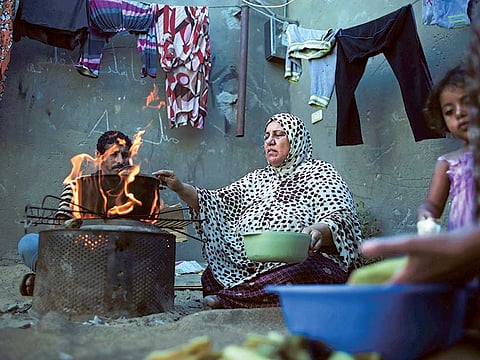Gaza slum growth illustrates economic spiral
The UN has warned that enclave could become ‘uninhabitable’ by 2020 if current trends continue

Al Zohor, Gaza Strip: The expansion of Gaza’s Al Zohor slum, where barefoot children play in the rusty skeletons of discarded vehicles surrounded by mountains of garbage, is a sign of the times in Gaza, where poverty is growing and there is little hope for the future.
While Gaza has always been poor, conditions for the 1.8 million people who live in the crowded seaside territory have worsened since the Israeli blockade of the strip after Hamas seized power in 2007.
Soon after the takeover, Egypt and Israel, citing security concerns, imposed a blockade on the territory in a move that had a devastating impact on the local economy. Deepening the despair, Hamas and Israel have fought three wars since the takeover. Some areas are still in ruins from the 2014 war and thousands of people are still displaced. The UN warned last year that Gaza could become “uninhabitable” by 2020 if current trends continue.
But even by Gaza standards, conditions are deplorable in the Al Zohor, or ‘Flowers,’ neighbourhood near the city of Khan Younis in the southern part of the territory. While Gaza’s poor generally have access to basic amenities, health care and municipal services in the neighbourhood are among the worst in the territory.
The shacks, adjacent to a landfill, have no electricity or running water. Piles of garbage encroach on the makeshift homes, covering rooftops with trash while the acrid smell of burning waste wafts over the squalour. The searing heat and long summer days have compounded the difficulty of fasting during the monthlong Ramadan holiday.
The neighbourhood didn’t even exist eight years ago. Today, about 50 families live there.
Locals say Hamas is intentionally making conditions worse in the neighborhood to try and force people off of public property. They say if Hamas finds electric wires connected to nearby utility poles it cuts the lines.
Resident Mahrous Zourob, a 33-year-old father of five, said Hamas imposes “impossible conditions” on the slum dwellers.
Each family has a story that reflects Gaza’s economic plight. Most say they lost their income when breadwinners could no longer enter Israel to work after Hamas took power. Zourob, who worked in as a labourer in construction, farming and Gaza’s smuggling tunnels on the Egyptian border before they were largely destroyed, said he used to live in a rental home but had to move out three years ago because of a lack of work.
Israel claims the blockade is essential to its security. Critics say the blockade, which has restricted the movement of people and goods in and out of the territory, amounts to collective punishment.
According to the UN, more than 800,000 people in Gaza receive food aid and nearly 50 per cent of the population is unemployed.
Aid worker Eyad Al Shami said he was “shocked from the situation of the families” in Al Zohor when he brought them meals donated by Saudi Arabia to end the Ramadan fast this week.
Asmahan Farwana said she sends some of her eight children to beg in the markets to buy food. Her husband had a workplace injury and can no longer work.
“Today, we found a meal, thank God,” she said after gathering her children around for a donated meal of chicken and rice.
Sign up for the Daily Briefing
Get the latest news and updates straight to your inbox



